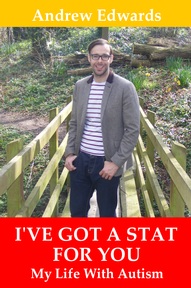Mother of autistic son told to 'watch Rain Man' and warned he will 'be institutionalised'
When her son was four, Hazel Davies was informed he had severe autism and was told by a medical specialist “Go home and watch Rain Man. In all probability your son will be institutionalised”.

However Ms Davies was determined to prove him wrong and so she dedicated herself to supporting her son Andrew Edwards and helping him achieve in life.
Decades later, Andrew has won a Welsh National Young Volunteer Award, given speeches, lectured to a wide range of audiences on autism and managed to secure his dream job as a statistician at Manchester United Television.
He has also written a book documenting his struggle with the condition called I’ve Got a Stat For You.
“One thing I hope the reader will learn from this book is that there is no stereotypical autistic person like the portrayals of the condition in feature films like Rain Man and Mercury Rising,” he says.
Light at the end of the tunnel
Andrew also wrote the book to “show parents who have just had a diagnosis of autism for their son or daughter that there is light at the end of the tunnel”.
He claims we all have autistic tendencies – from doing household chores in a particular order, collecting things like gig tickets, football programmes, vinyl or DVDs. “The difference being that it affects or consumes someone with an autistic spectrum disorder infinitely more greatly than someone without.”
He also suggests that some musicians, actors and top athletes have autism “due to the sheer dedication, almost beyond obsessional levels that it takes to reach the top of their chosen professions”.
Andrew was brought up in Wrexham, a town in North Wales. He was home educated after his mum picked him up from school one day and found he had been tied up in order to ‘control’ him. At the age of seven, he learnt all the multiplication tables in a couple of hours. At the age of eight he started attending a primary school but was repeatedly bullied. After leaving that school at the age of nine, his mum struggled to find an appropriate school for him.
Finally she found him a place at St Christopher’s Special Needs School in Wrexham.
As a teenager he liked to shock and greeted his community nurse with “Hello, Big Tits”. She took it all in her stride and responded “Hello, fat arse”.
Manchester United
Growing up he became a passionate Manchester United fan with his interest quickly becoming an obsession. “If United lost, it would really affect my weekend and my mood. I would be miserable and angry if United lost, but delighted if they won. I would sometimes stay in my room for hours on end if United had lost that weekend.”
Andrew admits to feeling “isolated, lonely and confused at times in school, as fellow pupils didn’t share my obsessional love of Manchester United”.
At the age of 18, he started giving talks to school pupils about autism. He found relating to them was helped by his encyclopaedic knowledge of football.
It was also his obsession with football that led to him getting a job at Manchester United TV doing stats for many of the games and for documentary shows. “The job wasn’t a job for me at all. I believed it was a calling”.
After working at Manchester United TV for over a decade he was made redundant and since then has been writing this book and volunteering.
Welsh Young Volunteer of the Year award
He won the Welsh Young Volunteer of the Year award for his talks on autism which led to him being invited to a Garden Party at Buckingham Palace.

A trait of his autism is talking to himself when he is in the house. “This behaviour is usually prevalent when I am enthused or my thoughts are running away with me. I speak to myself when I am stressed but also when I am excited and happy”. He also admits to keeping all his birthday and Christmas cards and all his text messages, keeping as much as two years’ worth of messages.
Andrew describes himself as a “contrasting mixture of traits. I can be confident and outgoing (even cocky), yet deeply insecure. I can be thoughtful, yet come across, at times, as selfish. I can clumsily attempt to help, but come across as domineering. I can be caring yet harsh. When I come to think of it, I suppose I am a bit of a contradiction, perhaps even slightly paradoxical in some respects. Will the ‘real’ Andrew please stand up? Which parts are me? Which are due to autism?” he wonders.
Awareness of autism has improved
Around 700,000 people are estimated to have autism in the UK, with five times as many males as females diagnosed with the condition. Awareness of autism has improved over recent years and Andrew points to developments such as autism-friendly screenings of films and TV shows such as the Autistic Gardener which he says “focussed on the green-fingered skills of people with autism rather than what they couldn’t do”.
However he notes that although support and understanding has improved greatly for children, it is not the same for adults. “This is something that needs to alter greatly as when you reach adulthood, autism is not recognised by certain organisations and there can be great difficulty with self-sufficiency or coping in the outside world without your family’s help”.
Luckily for Andrew, the support from his family has been life-changing: “I have been fortunate with Ma and Mel prodding me every day to self-improve and move on. They fight my corner incessantly and prod me ‘for the autism not to win!’”
Andrew Edward’s book I've Got a Stat For You: My Life With Autism is published by Bennion Kearny.
Latest Features News
 25-Nov-19
2019 Election: Boris Johnson leaves social care in 'too difficult box' but Labour vows to end 'crisis'
25-Nov-19
2019 Election: Boris Johnson leaves social care in 'too difficult box' but Labour vows to end 'crisis'
 18-Oct-19
Podcast: Wendy Mitchell and dementia: 'My biggest fear is not knowing who my daughters are'
18-Oct-19
Podcast: Wendy Mitchell and dementia: 'My biggest fear is not knowing who my daughters are'
 27-Sep-19
Exclusive: Care minister backs care workers' call for time off to grieve and attend funerals
27-Sep-19
Exclusive: Care minister backs care workers' call for time off to grieve and attend funerals
 19-Sep-19
Podcast: Gyles Brandreth says poetry helps ward off dementia
19-Sep-19
Podcast: Gyles Brandreth says poetry helps ward off dementia
 30-Aug-19
Edinburgh Fringe funnyman joins comics facing toughest audience at care home gig
30-Aug-19
Edinburgh Fringe funnyman joins comics facing toughest audience at care home gig